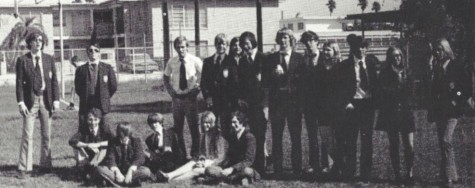Berkeley Alum Shines a ‘Spotlight’ on the Importance of Journalism
In 1972, Berkeley Preparatory School had 250 students. The graduating class of 1972 had 42 seniors; one of those seniors was a young Martin Baron. Baron—a member of the soccer team, a tennis player and a Cum Laude student during his time at Berkeley—would later go on to become one of the most respected editors in modern journalism. Over the course of his nearly four decades in the industry, he would work editorial roles at a slew of major newspapers across the country—including The New York Times, The Miami Herald and The Boston Globe—before arriving at his current job as the executive editor of The Washington Post, where he has worked since 2013.
Baron knew from a young age, even as far back as junior high, that he would pursue a career in journalism; it was during his time at Berkeley that his editorial career first began, as the editor-in-chief of a little-known paper called The Fanfare. “I was interested in the wider world […] and going to a school that I felt was kind of isolated from all that,” Baron said. His high school years—the end of the 1960s and the dawn of the 1970s—were “a bit of an activist time,” according to Baron, largely due to the interminable continuation of the Vietnam War, as well as the prominence of racial issues in the social consciousness.

Pictured is The Fanfare staff in 1972; Martin Baron ’72 (seated, extreme left) served as the editor-in-chief.
Nonetheless, Baron noticed “a notable lack of activism at the school,” often because students’ affluence caused them to be out of touch with the world around them; in fact, he discussed this trend in an editorial column published in The Fanfare during his senior year, when he served as editor-in-chief. “Blinded by affluence and sheltered behind stately country club walls, far too many Berkeley students are unaware of the tragic waste of human potential in so many public schools today,” Baron wrote in a May 1972 op-ed. Articles like this one—including numerous editorials—seem to be the trend, not the exception, in the 1972 issues of The Fanfare, and Baron admitted that he did hope to create some active conversations among the student body with these columns. “I felt that it was an appropriate role for the school newspaper to deal with real issues, and talk about them honestly,” a tendency Baron said was not particularly common at Berkeley at this time. “I did feel that people were insulated from the kinds of lives that other people led and that that’s something that we oughta talk about.”
Unsurprisingly, Baron’s work on The Fanfare stirred up some controversy, leading, as he admitted, to “some clashes with the administration.” His articles, always poignant and never timid, refused to shy away from the issues plaguing the educational community at large, whether it was integrated busing or the affluent apathy of Berkeley students. “A lot of parents, as well as the administration, felt the newspaper was simply supposed to be a booster of the school, and everything about the school, and that wasn’t my view,” he said. The lesson he took away from his experience on The Fanfare? “Don’t be afraid to challenge authority.” This advice would turn out to be a defining trend in his career.
In 2002, The Boston Globe—under Baron’s editorial leadership—exposed what has since become a paradigm-shifting scandal. The Globe revealed that Catholic priests throughout the Boston area had, for decades, committed serial sexual abuse, a heinous crime that had been not only known, but also covered up, by many higher-ups in the church’s hierarchy. The investigation uncovered a trend within the church, wherein priests who committed abuse were not removed from the ministry, but rather merely reassigned to a different parish, and thus able to continue their abuse of innocent youths. The Globe’s extensive investigation not only exposed the massive issue of abuse within the Catholic church in Boston, but also prompted victims across the country and world to come forward, revealing that the issue of sexual abuse in the Catholic church was of unimaginable proportions, a virtual epidemic within the ministry.
“The question [was]: is this the policy of the church to allow these abusers to remain in ministry, notwithstanding the fact that they have abused again and again, and it turned out that it was, and the purpose of that was to avoid scandal in the church, to avoid damaging the reputation of the church, and they did everything possible to avoid scandal and they didn’t do everything possible to protect the children and their families, and that’s the shame of it all,” said Baron of the scandal. Still, he noted that it was the most fulfilling story he’s worked on in his long and storied career, both because of the pressure it has put on the church to institute reforms, and because “it has given a voice to people who were essentially voiceless—the survivors of abuse.” Truly, the story has had an immeasurable impact, not only by empowering survivors, but also by challenging the behavior of the Catholic church.
“It held one of the world’s biggest and most powerful institutions accountable, finally, after decades and decades of covering up,” said Baron.
Over a decade later, the story of The Boston Globe’s investigation would be turned into one of the top movies of 2015, “Spotlight,” which became something of a critical darling; it garnered numerous award nominations at the Oscars and Golden Globes, as well as a win at the Screen Actors Guild Awards and two Oscar wins, including Best Picture. “I hope that this movie will cause people to listen to people who’ve fallen to the margins of society, or been pushed to the margins of society, and allow them to have a voice, to listen to their voices, to hear what they have to say, because very often, they have something very powerful to say,” said Baron of the film.
Baron’s portrayal in the movie has also significantly boosted his national profile. Already maintaining a remarkable reputation in journalistic spheres, he has recently gained prominence even more broadly; yet, Baron remains unshakably humble, as he has throughout his career, eager to shift the glory to those around him. “There are a lot of people in the profession who do amazing work, groundbreaking work, and they have great reputations in the field, but they are not generally known among the public, because they didn’t appear on the big screen,” he noted.
To high school journalists, Baron offers a plethora of wisdom, drawn from his extensive experience. “It’s hard to be a high school journalist,” he said, due to the laws which regulate high school publications. Still, to these students, and to the journalists of the future, “you have to follow your passion,” he said. “There are many people who say that you shouldn’t go into journalism because the field is dying. The field is not dying, the field is being reinvented, and so, people who go into journalism can be part of that reinvention.”
One of the last things Baron shared during the interview serves not only as insightful advice for journalists, but also as a fitting mission statement that seems to have guided the entirety of his unparalleled career: “I believe in reporting responsibly, honorably, honestly, accurately, fairly—all that. But when you do all that, then you need to tell people what you’ve found and you should do it unflinchingly.”

Maya, a senior, previously worked as a staff writer and a Features editor on The Fanfare, and is excited to be serving her second year as co-Editor-in-Chief....

